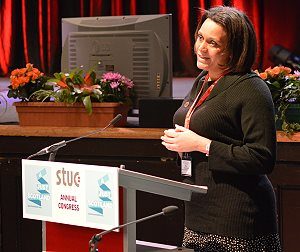
#STUC16 The STUC is calling for equal pay to be a manifesto commitment for all parties ahead of the Scottish election and for the establishment of an “Equal Pay Employer Scheme” to provide accreditation for equal pay employers.
Supporting the University and College Union motion, UNISON’s Davena Rankin, who is also the Chair of the STUC Women’s Committee told delegates that the pay gap is still very much alive today despite the 1970 Equal Pay Act.
“As we approach its important anniversary, it is infuriating to note the lack of progress in ending the pay gap and the sloth-like speed at which governments across the UK are moving to close the gap,” said Davena.
“The fight to end the gender pay gap is at its heart about the fight for workplace justice. It is about the basic right to be paid fairly for the work we do regardless of our gender.”
Davena looked back at the history of the fight for equal pay and reminded delegates that the TUC first debated a resolution back in 1888.
The response from Westminster was slow and it wasn’t until 1944 that a Royal Commission on equal pay warned that paying women the same as men “may prove disastrous in the long run even to young and strong women by heavily overtaxing their nervous and muscular energy”.
“Times have changed,” said Davena, “And it is now illegal to advertise a job with different rates of pay for men and women which in theory should have seen the end of the gender pay gap.”
However that hasn’t happened and Davena warned that even when jobs in theory pay the same, if you look behind the raw data women are still clustered at the bottom of the pay scale with men at the top.
“So it is really important that we do not allow employers to hide behind woolly statements that mask the real implications of discretional bonuses, poor recruitment practices that can see men appointed at higher points in pay scales and the resistance of employers towards requests for flexible working,” said Davena, calling for real action on ending the pay gap not just warm words from politicians.
